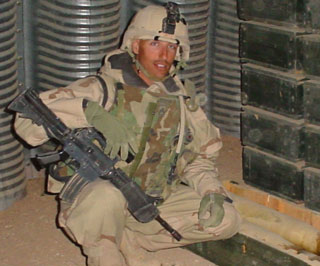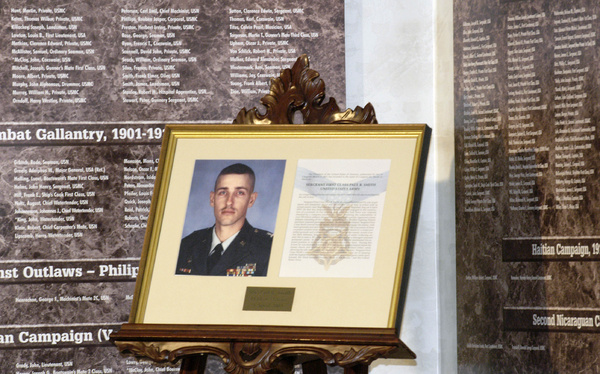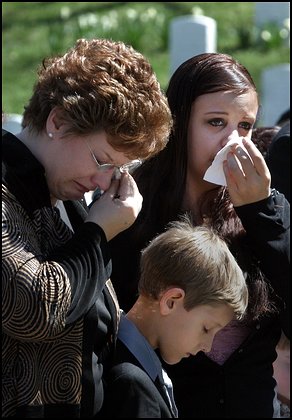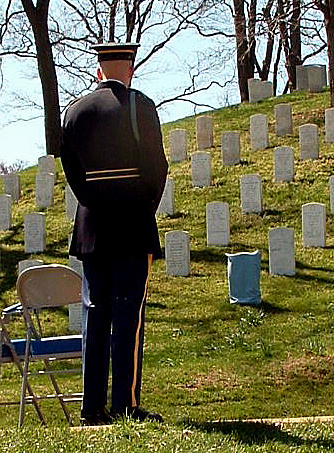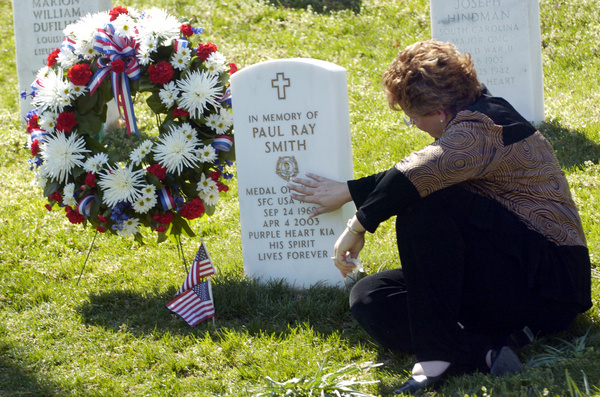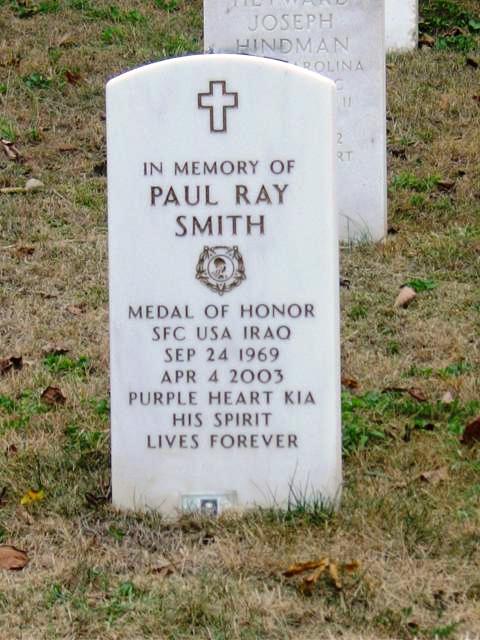President Presents Medal of Honor to Sergeant First Class Paul Ray Smith
The East Room
THE PRESIDENT: Good afternoon and welcome to the White House. Today is a special occasion: We are here to pay tribute to a soldier whose service illustrates the highest ideals of leadership and love of our country.
Sergeant First Class Paul Ray Smith, of Florida, gave his life for these ideals in a deadly battle outside Baghdad. It is my great privilege to recognize his extraordinary sacrifice by awarding Sergeant Smith the Medal of Honor.
I appreciate Secretary Don Rumsfeld joining us today; Secretary Jim Nicholson, of the Department of Veterans Affairs; Senator Carl Levin, Senator Bill Nelson, Senator Mel Martinez, Senator Johnny Isakson and Congressman Ike Skelton. Thank you all for joining us.
I appreciate Secretary Francis Harvey, Secretary of the Army; General Dick Myers, Chairman of the Joint Chiefs of Staff; General Pete Pace, Vice Chairman; General Pete Schoomaker, Chief of the Army.
I want to thank the Medal of Honor recipients who have joined us today: John Baker, Barney Barnum, Bernie Fisher, Al Rascon and Brian Thacker. Honored you all are here.
I appreciate the family members who have joined us today. Thank you all for coming: Birgit Smith, his wife; Jessica Smith; David Smith; Janice Pvirre, the mom; Donald Pvirre, stepfather, and all the other family members who have joined us. Welcome.
I appreciate Chaplain David Hicks, for his invocation. I want to thank Lieutenant Colonel Tom Smith, for joining us, who was Paul Smith's commander. I particularly want to welcome soldiers from the 3rd Infantry Division, Paul's unit in Iraq.
The Medal of Honor is the highest award for bravery a President can bestow. It is given for gallantry above and beyond the call of duty in the face of enemy attack. Since World War II, more than half of those have been awarded this medal gave their lives in the action that earned it. Sergeant Paul Smith belongs to this select group.
The story of Paul Smith is a story of a boy transformed into a man and a leader. His friends and family will tell you that he joined the Army in 1989, after finishing high school. When he joined the Army, he was a typical young American. He liked sports, he liked fast cars, and he liked to stay out late with his friends — pursuits that occasionally earned him what the Army calls “extra duty.” (Laughter.) Scrubbing floors.
Two things would change Paul's life and lead him to the selfless heroism we honor today. The first would come when he was stationed in Germany and fell for a woman named Birgit Bacher. It turns out that Paul had a romantic streak in him: On the first night he met her, Paul appeared outside Birgit's window singing “You've Lost That Loving Feeling.” (Laughter.) In 1992, the two married, and soon, a young soldier became a devoted family man who played T-ball with his son and taught his daughter how to change the oil in his Jeep Cherokee.
Second great change in Paul's life would come when he shipped off to Saudi Arabia to fight in the first Gulf War. There the young combat engineer learned that his training had a purpose and could save lives on the battlefield. Paul returned from that war determined that other soldiers would benefit from the lessons he had learned.
Paul earned his sergeant's stripes and became known as a stickler for detail. Sergeant Smith's seriousness wasn't always appreciated by the greener troops under his direction. Those greener troops oftentimes found themselves to do tasks over and over again, until they got it right. Specialist Michael Seaman, who is with us today, says, “He was hard in training because he knew we had to be hard in battle.” Specialist Seaman will also tell you that he and others are alive today because of Sergeant Smith's discipline.
That discipline would be put to the task in a small courtyard less than a mile from the Baghdad airport. Sergeant Smith was leading about three dozen men who were using a courtyard next to a watchtower to build a temporary jail for captured enemy prisoners. As they were cleaning the courtyard, they were surprised by about a hundred of Saddam Hussein's Republican Guard.
With complete disregard for his own life and under constant enemy fire, Sergeant Smith rallied his men and led a counterattack. Seeing that his wounded men were in danger of being overrun, and that enemy fire from the watchtower had pinned them down, Sergeant Smith manned a 50-caliber machine gun atop a damaged armor vehicle. From a completely exposed position, he killed as many as 50 enemy soldiers as he protected his men.
Sergeant Smith's leadership saved the men in the courtyard, and he prevented an enemy attack on the aid station just up the road. Sergeant Smith continued to fire and took a — until he took a fatal round to the head. His actions in that courtyard saved the lives of more than 100 American soldiers.
Scripture tells us, as the General said, that a man has no greater love than to lay down his life for his friends. And that is exactly the responsibility Paul Smith believed the Sergeant stripes on his sleeve had given him. In a letter he wrote to his parents but never mailed, he said that he was prepared to “give all that I am to ensure that all my boys make it home.”
On this day two years ago, Sergeant Smith gave his all for his men. Five days later, Baghdad fell, and the Iraqi people were liberated. And today, we bestow upon Sergeant Smith the first Medal of Honor in the war on terror. He's also the first to be awarded this new Medal of Honor flag, authorized by the United States Congress. We count ourselves blessed to have soldiers like Sergeant Smith, who put their lives on the line to advance the cause of freedom and protect the American people.
Like every one of the men and women in uniform who have served in Operation Iraqi Freedom, Sergeant Paul Smith was a volunteer. We thank his family for the father, husband and son and brother who can never be replaced. We recall with appreciation the fellow soldiers whose lives he saved, and the many more he inspired. And we express our gratitude for a new generation of Americans, every bit as selfless and dedicated to liberty as any that has gone on before — a dedication exemplified by the sacrifice and valor of Sergeant First Class Paul Ray Smith.
And now if his family would join me, please. Lieutenant Commander, please read the citation.
(The citation is read and the medal is presented.)
Sergeant First Class Paul Ray Smith
B Company, 11th Engineer Battalion, 3rd Infantry Division, United States Army
Sgt. 1st Class Paul Ray Smith will receive the Medal of Honor posthumously during a White House ceremony April 4, 2005.
Spouse: Birgit Smith
Children: David A. Smith, Jessica M. Smith
Parents: Donald and Janice Pvirre
Hometown: Tampa, Florida
Graduated Tampa Bay Technical High School
Enlisted: October 1989
Completed Basic and Advanced Individual Training at Ft. Leonard Wood, Missouri
Assignments: 82nd Engineer Battalion (Bamberg, Germany), 1st Engineer Battalion (Fort Riley, Kansas), 317th Engineer Battalion (Fort Benning, Georgia), 9th Engineer Battalion (Schweinfurt, Germany), 11th Engineer Battalion (Fort Stewart, Georgia)
Deployments: Persian Gulf War, Bosnia-Herzegovina, Kosovo, and Operation Iraqi Freedom
The personal character of Sergeant First Class Smith is best described through some anecdotes his sister related in a speech about her brother:
“Paul Ray had an incredible love for the troops under his command. One Christmas, the wife of a Soldier in Paul Ray’s platoon had just had surgery and the Soldier and his wife were unable to provide a Christmas for their family. So, Paul Ray collected food from the company Christmas party, and he and Birgit bought presents for the children, and they took them to the Soldier’s home.” Paul Ray’s family never heard of this until recounted to them by friends after his death. “Another…..very descriptive event that showed Paul Ray’s concern for his men involves another Soldier whose baby daughter was unexpectedly admitted to the hospital with a serious illness. Paul Ray would drive an hour out of town every night to give his support to this Soldier and his wife.” In the last letter that Paul Ray wrote to the parents from Iraq, he told them “..now that he was a father himself, he realized just how much they had sacrificed to make his life a good life and he thanked them for that special effort. He spoke of being prepared to give—as he said—‘all that I am, to ensure that all my boys make it home.’ In that same letter, he told our parents how proud he was of the ‘privilege to be given 25 of the finest Americans we call Soldiers to lead into war’ and he recognized their fears and his responsibilities for their welfare.”
Paul Ray Smith was born on September 24, 1969, in El Paso, Texas. At the age of nine, his family moved to South Tampa, Florida, where he attended public schools. He enjoyed sports, liked cats, skateboarding, riding bicycles, and playing pranks with friends and his younger sister Lisa. He particularly enjoyed football, which instilled the importance of being part of a team and motivated his natural leadership abilities.
He developed an interest in carpentry while in high school and was employed part-time as a carpenter assistant. Paul Ray had an interest in old cars–he enjoyed taking things apart to see how they worked. He restored a dune buggy with a friend. He liked to collect things from the sea, rocks in general, marbles. His family remembered that as far back as they could recall, when anyone would ask what he wanted to do as an adult, he always said, “I want to be a Soldier, get married, and have kids.”
Upon graduating in 1988 from Tampa Bay Vocational Technical High School, he joined the Army and attended Basic Training at Ft. Leonard Wood, Missouri. As his mother wrote in his biography for a dedication ceremony in Orlando, he had begun living his dream…he was assigned to Germany, met and married his wife, Birgit, had two children, and was “doing what he was born to do…. Lead American Soldiers….” Sgt. 1st Class Smith served as a combat engineer and was deployed to Kuwait during the Persian Gulf War, Bosnia-Herzegovina, Kosovo, and finally to Operation Iraqi Freedom.
Sergeant First Class Smith joined the 11th Engineer Battalion in 1999 and immediately became an integral part of Bravo Company. When he deployed with his platoon to Kosovo in May 2001, as part of the KFOR 3A rotation, Smith was responsible for daily presence patrols in the highly populated town of Gnjilane. In the spring of 2002, he was promoted to sergeant first class and completed the Advanced Non-Commissioned Officer Course in August 2002.
In January 2003, Sgt. 1st Class Smith returned from leave to prepare his men for rapid deployment to Kuwait as part of the 3rd Infantry's Divisions buildup for Operation Iraqi Freedom. Smith took a strict approach to training his men, ensuring that his platoon was proficient in handling weapons and prepared for urban combat.
Bravo Company crossed the border on March 19th and traveled more than 300 kilometers in the first 48 hours of the war as part of the lead company in support of Task Force 2-7 Infantry. Passing through the Karbala Gap, Smith and his men pushed through the night of of April 3, 2003, towards Baghdad Airport where Bravo Company, 11th Engineer Battalion of Task Force 2-7 were involved in a firefight with Iraqi forces. Sgt. 1st Class Smith's heroic actions and tragic death are described in more detail in the battlescape section of this website and in his Medal of Honor Citation.
Awards: Medal of Honor, Bronze Star, Purple Heart, Army Commendation Medal, Army Achievement Medal, National Defense Service Medal, Armed Forces Expeditionary Medal, South West Asia Service Medal, Army Service Ribbon, Overseas Service Ribbon, NATO Medal, Kuwait Liberation Medal, Valorous Unit Award, Army Superior Unit Award, German Marksmanship Badge, French Armed Forces Commando Badge
Schedule of events
Due to space limitations, all events are strictly by invitation only.
White House Announcement
March 29, 2005
White House Ceremony
3:00PM EST April 4, 2005
Hall of Heroes Ceremony
11:00AM EST April 5, 2005
Arlington National Cemetery Ceremony
1:00PM EST April 5, 2005
Media queries should be directed to:
Major Elizabeth Robbins
Office of the Chief of Public Affairs, U.S. Army
[email protected]
(703) 697-5343
Thursday, 31 March 2005
By Deborah Sharp
Courtesy of USA TODAY
Sergeant First Class Paul Ray Smith of Tampa left his wife and two children to go to the war in Iraq. At 33, he came to think of the soldiers he led as his “boys.” Many were younger than him by a decade or more.
Smith wrote to his family that he was prepared to give everything he had to make sure “all my boys make it home.” In a battle near the airport in Baghdad two years ago, he kept that promise. But in doing so he died, the only member of his platoon lost that day, April 4, 2003.
At a White House ceremony Monday, exactly two years after his death, Smith's family will receive his Medal of Honor, the nation's highest award for battlefield valor. It's a rare honor.
More than 1 million U.S. men and women have served in Iraq and Afghanistan since 2001, but Smith is the first to receive the Medal of Honor. It will be the first such medal issued in 12 years, when two soldiers were given it posthumously for actions in Somalia in 1993. Their battle was recounted in the book and film Black Hawk Down.
More than 42 million Americans have served in U.S. wars, but only 3,459 Medals of Honor have been awarded since the Civil War.
“Sergeant First Class Smith answered the calling, completed the mission, saved his fellow soldiers and made the supreme sacrifice in doing so,” said Major Elizabeth Robbins, an Army spokeswoman.
Smith was based at Fort Stewart in Georgia and served in several hot spots since enlisting in the Army in 1989. Shortly after the war in Iraq began, his 11th Engineer Battalion of the Army's 3rd Infantry Division had the task of creating a holding area for prisoners of war. Smith found a spot within a courtyard near the airport in Baghdad and set his men to work building a cell.
But Iraqi forces advanced. Soon, Smith's platoon was under attack by as many as 100 enemy soldiers, according to news and military accounts.
Smith tossed a grenade over the wall, and then he climbed atop an armored vehicle. Disregarding personal danger, he sprayed the attacking troops with .50-caliber machine gun. According to the Army, he told a soldier who accompanied him to “feed me ammunition whenever you hear the gun get quiet.” He aimed more than 300 rounds at the Iraqis before he was killed by enemy fire.
“Smith's actions saved the lives of at least 100 soldiers … and resulted in an estimated 20-50 enemy soldiers killed,” the citation reads.
His “conspicuous gallantry, above and beyond the call of duty,” according to the citation, protected the soldiers in his platoon as well as other troops at an aid station nearby.
Smith's heroism met an important criteria for the medal: He rushed in to defend others, knowing he could lose his life in the process. Audie Murphy, a World War II hero who became a movie star, won his Medal of Honor for a similar action: Manning a machine gun on a burning, abandoned tank, he killed 50 advancing German soldiers.
“It's a situation where most rational people would back out, and they wouldn't be criticized,” says David Burrelli, a Library of Congress researcher who specializes in military matters.
“It's going beyond what you're supposed to do.”
Smith was born in El Paso and moved to Tampa when he was 9. One of four siblings, he loved to collect rocks and was good at taking things apart. When he stripped a radio, there were always pieces left over, but it still ended up working.
He loved to fish, “but we'd have starved to death if we'd had to depend on his fishing skills,” jokes Smith's sister, Lisa DeVane, 37.
He enlisted in the Army right after graduating from Tampa Bay Technical High School. He met his wife, Birgit, when he was stationed in Germany. They married in 1992. Since her husband was killed, Birgit Smith, 38, says she's heard from the wives of other soldiers who survived that day.
“They say, ‘Because of your husband, mine made it home,' ” she says. “Paul laid down his life for his soldiers.”
DeVane says the black-and-white, right-or-wrong ways of the military suited her brother. He rode his soldiers hard, insisting that everything be done by the book.
But he had a soft side, too. He was thrilled when DeVane gave birth three years ago to his niece. DeVane named the girl Olivia Ray, making Paul's middle name her daughter's as well.
“I still cry, and I still miss him,” DeVane says. “He's the perfect example of good and decent. I learned a lot about life from my little brother.”
Smith once drove 40 miles from Fort Stewart to deliver a teddy bear to the young daughter of one of his men, who was hospitalized with a serious illness. Another time, he counseled a soldier having marital problems, arranged visits with the base chaplain and financial experts, and allowed him time away from Fort Stewart to settle his problems in family court.
“I'd always seen him as this hard (guy), but when I had a problem, it was like Dr. Jekyll and Mr. Hyde, he was so nice,” says Robert Mullins, 24, a former solider who trained under Smith at Fort Stewart and served with him in Kosovo. “He would talk to me like a brother, or a father.”
Mullins, now a mechanic in Knoxville, Tennessee, says he's proud of his former sergeant. But as a father of three, he also thinks about the children Smith left behind. “I don't think a medal can heal those wounds,” he says.
Smith's widow says she works to keep his memory alive for their children, David, 11, and Jessica, 18. Smith adopted Jessica, Birgit's daughter from a previous relationship, after the couple married. President Bush will present the medal to young David at Monday's ceremony.
Smith's body was cremated, and most of his remains were scattered over Tampa Bay. But Birgit Smith keeps a portion of her husband's ashes in a locket that hangs from the windshield of her car. She believes her husband's spirit is still with her. Sometimes she smells his aftershave or feels the embrace of his arms around her. Once his picture fell off the wall, and she was sure it was Paul, sending a message that he's always there watching over her.
“We feel him all around us,” she says.
Two years to the day after Sgt. 1st Class Paul Ray Smith fought and died on a dusty road outside Baghdad, President Bush handed the soldier's 11-year-old son a glass-encased Medal of Honor in the name of Congress and the nation.
In the East Room of the White House, with the imposing portraits of Washington and Theodore Roosevelt looking on, Bush handed Smith's family what he described as the “first Medal of Honor in the war on terror.”
Smith, who is credited with rallying the defense of his platoon in the face of a near-overwhelming counterattack by Iraqi forces after the 3rd Infantry Division seized Saddam International Airport, is the first person to be awarded the country's highest award for valor since the wars in Iraq and Afghanistan began.
In fact, only two Medals of Honor have been awarded since Vietnam. Both were given to Delta Force operators — Master Sgt. Gary I. Gordon and Sgt. 1st Class Randall D. Shughart — after the pair were killed trying to save downed aviators in Somalia in 1993. Nearly half of all who have received the award have died earning it.
“On this day two years ago, Sgt. Smith gave his all for his men,” Bush said. “Five days later, Baghdad fell, and the Iraqi people were liberated. And today, we bestow upon Sgt. Smith the first Medal of Honor in the war on terror.”
With the Pentagon brass in attendance, alongside congressional leaders and a handful of Smith's soldiers flown in from Iraq — where they are now serving their second combat tour — Smith's son David stoically accepted the award for the family as his widowed mom wiped away tears.
“The story of Paul Smith is a story of a boy transformed into a man and a leader,” Bush told the assembly. After joining the Army in 1989, Bush said Smith remained “a typical young American. He liked sports, he liked fast cars, and he liked to stay out late with his friends — pursuits that occasionally earned him what the Army calls ‘extra duty' scrubbing floors.”
After his first combat tour during the 1991 Gulf War, however, Smith earned his sergeant's stripes and became known as a stickler for detail.
“Sgt. Smith's seriousness wasn't always appreciated by the greener troops under his direction,” said Bush. “Those greener troops oftentimes found themselves to do tasks over and over again, until they got it right. Spc. Michael Seaman, who is with us today, says, ‘He was hard in training because he knew we had to be hard in battle.' Spc. Seaman will also tell you that he and others are alive today because of Sgt. Smith's discipline,” Bush said.
In a letter written to his parents but never mailed, Smith wrote he was prepared to “give all that I am to ensure that all my boys make it home.”
And that's exactly what it took.
“Sgt. Smith's leadership saved the men [under him that day],” Bush said, “and he prevented an enemy attack on the aid station just up the road.”
Manning an heavy machine gun atop a armored personnel carrier, “Smith continued to fire until he took a fatal round to the head.
“We recall with appreciation the fellow soldiers whose lives he saved, and the many more he inspired. And we express our gratitude for a new generation of Americans, every bit as selfless and dedicated to liberty as any that has gone on before — a dedication exemplified by the sacrifice and valor of Sgt. 1st Class Paul Ray Smith.”
Medal of Honor Awardee Smith Inducted Into Hall of Heroes
By Terri Lukach
American Forces Press Service
WASHINGTON, April 5, 2005 – A modern hero today joined an elite group of warriors — Medal of Honor recipients whose valor, sacrifice and selfless service to the nation are immortalized in the Pentagon’s Hall of Heroes.
Army Sgt. 1st Class Paul R. Smith was posthumously inducted into the Pentagon Hall of Heroes at a ceremony April 5. President Bush awarded the Medal of Honor to Smith's family in White House ceremonies April 4. Smith is the first to receive the military's highest award for his actions in the war on terror.
Army Sgt. 1st Class Paul Ray Smith was posthumously awarded a Medal of Honor in a White House ceremony April 4. Today the Defense Department recognized that honor in a separate ceremony.
“Paul R. Smith now belongs to that singular pantheon of brave patriots who fought for something even more sacred than their own lives,” Secretary of Defense Donald Rumsfeld said at today’s event. “Our history is truly blessed with such heroes.”
“We stand in awe of the heroism described in his citation. … Standing here today, one need not look far to understand what motivated his bravery,” Rumsfeld said at the gathering, which included Smith’s widow and two children, his parents, and other family members.
“We see it in the shared pride and grief of those he loved,” he said, “in his children, David and Jessica, who daily brought him joy; in his wife, Birgit, whom Paul, in his final words, compared to the brightest star in the sky; and in his family, who saw the boy from Tampa (Fla.) become the man who crossed deserts to topple a tyrant and defend our nation.”
Smith was part of the 3rd Infantry Division’s buildup for Operation Iraqi Freedom. He died in the battle for Baghdad’s airport on April 4, 2003 – two years to the day before President Bush awarded his medal of honor.
According to the medal citation, Smith fired on advancing enemy soldiers from an unprotected position atop an armored personnel carrier, expending “at least three boxes of ammunition before being mortally wounded by enemy fire.
“The enemy attack was defeated,” the citation said. Smith’s actions “saved the lives of at least 100 soldiers, caused the failure of a deliberate enemy attack, … and resulted in an estimated 20-50 enemy soldiers killed.”
During today’s ceremony, Army Chief of Staff Gen. Peter J. Schoomaker said Smith’s valor places him among the ranks of the nation’s most courageous warriors. He congratulated Smith’s family “on the great honor our country and our commander in chief have bestowed on your soldier.”
“All Americans stand taller today with pride and gratitude as they recognize Sergeant 1st Class Smith for his heroic actions in Iraq,” Schoomaker said. He also thanked the Smith family for their own “years of service and great sacrifice as an Army family.”
Army Secretary Francis Harvey told the family, “We mourn your loss and celebrate with you the life of a truly extraordinary man.”
Harvey said Smith “lived the Army values and was the embodiment of the warrior ethos. Paul Smith always placed the mission first. He never accepted defeat; he never quit; and he never left a fallen comrade.
Harvey said many other soldiers are alive today thanks to Smith’s leadership and sacrifice. “The nation and free peoples around the world sleep better tonight because of the willingness of soldiers like Paul Smith to sacrifice everything so that others might live in peace and freedom,” the Army secretary said.
Smith “left his family and his country a life of great meaning and entrusted us with his faith in America and its mission,” Rumsfeld said. “For that faith, he laid down his life. For that sacrifice, we are forever in his debt. And in his name, we are called upon to ensure that his trust was well-placed and made to endure.”
Following remarks by DoD officials, Smith’s widow, Birgit, told the assembly how proud she was to receive the Medal of Honor on behalf of her husband.
“Paul loved his country, he loved the Army, and he loved his soldiers. He loved being a sapper (Army engineer). He died doing what he loved,” she said.
She thanked the Army for giving her husband the opportunity “to fulfill his dream of serving his country.” She said she and her family “continue to be overwhelmed by the American people's appreciation of his service.”
A native of Germany, Birgit Smith recalled how American soldiers liberated her country from tyranny 60 years ago in World War II. “Today another generation of American soldiers has given the Iraqi and the Afghan people a new birth of freedom,” she said.
“This is an ideal that Paul truly believed in,” she said, adding, “I'm sure Paul would be proud to know that I have begun the process of becoming an American citizen.”
Addressing Smith’s 3rd Infantry Division comrades, Birgit encouraged them to tell their stories so “the American people and the world will better understand the sacrifice of Paul and others like him.”
She ended her remarks with the universal Army cry of “Hooah!’”
Later in the day another ceremony, to unveil the fallen soldier’s headstone, was conducted at nearby Arlington National Cemetery.
Marker Placed for Medal of Honor Winner
Arlington Ceremony Caps Moving 2 Days for Family
By Leef Smith
Courtesy of the Washington Post
Wednesday, April 6, 2005
Everyone descended the grassy hillside at Arlington National Cemetery — everyone but Birgit Smith. The widow stayed seated on the ground and stroked the white marble memorial gravestone.
Despite the click, click, click of news photographers' cameras and the crowd of friends and family who gathered at the cemetery yesterday, Smith stopped for an otherwise private moment with her husband, Sgt. 1st Class Paul Ray Smith, 33.
Birgit Smith and children David, 11, and Jessica, 18, at the Arlington National Cemetery ceremony.
“I told him that we did it,” she said later in the day, “and that I love him.”
That marked the end of an emotional ceremony to unveil a marker for Smith at Arlington, though his cremated remains are at his home in Holiday, Fla. Smith, the only American to die in an April 4, 2003, skirmish outside Baghdad, is credited by the Army with single-handedly killing 20 t0 50 enemy soldiers in the Iraqi Republican Guard and saving 100 of his own troops.
On Monday, President Bush posthumously awarded Smith the Medal of Honor, the nation's highest award for bravery in combat.
The White House ceremony was poignant and proud for Smith's family. But it was yesterday's unveiling, held in the cemetery where tributes to the fallen line the manicured lawns as far as the eye can see, that caused the family's emotions to spill over.
The U.S. Army Band played “Pershing's Own,” family members laid a wreath at the marker and speakers hailed Smith as a hero and an inspiration to others. Kneeling before the headstone, his wife gripped it with both hands, bestowing a gentle kiss. Her son, David, 11, tried to comfort his mother, putting a hand on her shoulder.
Smith was deployed to Iraq as a platoon sergeant in B Company, 11th Engineer Battalion, 3rd Infantry Division. Army officials said he climbed atop an armored vehicle in place of an injured crew member and held off the enemy with a .50-caliber machine gun before taking a bullet to the head.
“Lord, we pray this memorial stone will always evoke an acute sense of respect for Sgt. 1st Class Paul Smith and all who gave their lives for the preservation of freedom,” said Col. James May, command chaplain for the Military District of Washington, who delivered yesterday's invocation. “May those who love liberty see this marker and be inspired to a higher courage and a deeper conviction of duty and honor.”
As taps was played from a hilltop, Birgit Smith and her children, David and Jessica, 18, clutched each other in a single hug and wept.
After the ceremony, Birgit Smith characterized her family as strong. But the loss, she said, still weighs heavily, and the award has them reliving the pain of losing a father and a husband.
“It freshens everything up all over,” she said. “It's very tough. We just take it one day at a time.”
A soldier stands watch at the Arlington National Cemetery site of a memorial headstone for Operation Iraqi Freedom Medal of Honor recipient
Army Sgt. 1st Class Paul Ray Smith. Smith’s widow and children unveiled the headstone in an April 5 ceremony.
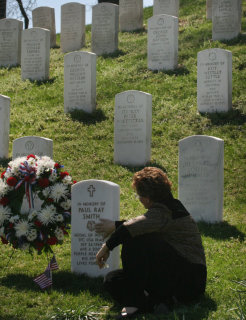
Brigit Smith Visiting Her Husband's Memorial Stone At Arlington National Cemetery – April 2005
The day before, the young widow and her two children accepted the hero’s Medal of Honor from the president. Just before they came to the cemetery, they’d seen him enshrined in the Pentagon’s Hall of Heroes. Now, the family of Army Sgt. 1st Class Paul Ray Smith — his widow, Birgit, and their two children, Jessica and David — unveiled his memorial stone before a small company of family and friends.
Smith was killed in a firefight with Saddam Hussein’s forces at Baghdad International Airport on April 4, 2003, while saving the lives of more than 100 fellow soldiers. His Medal of Honor – the nation’s highest award for valor in combat — is the first awarded for service in Operation Iraqi Freedom and the global war on terror.
Soldiers from the Army’s 3rd Infantry Division, who were part of the mission in which Smith gave his life, also were present at the ceremony.
Sgt. Maj. of the Army Kenneth O. Preston called Smith’s memorial an important reminder to soldiers past and present and to the more than 4 million people who visit Arlington each year that “freedom is not free.” He also called Smith a dedicated soldier who “solidified the very core of our Army.”
“On that day, 100 American soldiers witnessed and learned leadership of extraordinary proportions — leadership that changed and influenced their lives forever,” Preston said. “Those 100 men will in turn lead hundreds of soldiers, who will benefit from the leadership gained from serving with Sergeant 1st Class Smith. That process will continue to be shared across the entire Army from one unit to another.” Preston said that with the permanent memorial at Arlington, Smith has “become a part of the history of our country.”
“For as long as our flag stands,” he said, “these 200 hundred acres of sacred ground will cradle our heroes and the memory of Paul’s commitment.”
The memorial erected for Smith is one of only six such markers scattered throughout Arlington.
Below the hilltop on which the ceremony took place, a sloping sea of weathered white headstones falls away as far as the eye can see. As the group was gathered, the haunting sound of “Taps” could be heard rising up from another service far below.
Following Preston’s remarks, Birgit, Jessica and David Smith approached the memorial draped in blue fabric. As the shroud was removed, Smith’s widow knelt, caressed the stone, and wiped away a tear as she kissed the marker.
A lone bugler sounded “Taps,” this time for Smith, after Birgit placed a red, white and blue wreath at the site.
April 7, 2005:
The widow of the nation's first Medal of Honor recipient in the war on terror yesterday shared the very private moment in which she honored her fallen hero husband.
The day after receiving the medal from President Bush at the White House on Monday, Birgit Smith nestled at the headstone of her husband, Sgt. 1st Class Paul Smith, in Arlington National Cemetery.
“When I had a moment to sit down, I said to Paul in my head, ‘Mission accomplished,' ” she told The Post yesterday, recalling that she followed that with, “Hoo-ah!” — the Army's motivational “can do” phrase.
“After Paul died, I just wanted him to [be part] of history and we achieved that. I'm proud to be part of the military, to see my husband living his dream and serving his country.”
Smith, who lives in Florida, plans to visit Ground Zero today.
Both she and Paul Smith's commanding officer said they were not surprised the sergeant took charge on April 4, 2003, near Baghdad Airport and battled elements of the advancing Republican Guard and Saddam Fedayeen.
“If he didn't respond that way, we would have thought something was wrong with him,” said Smith, who met her husband in Germany. “He was a born leader.”
Lt. Col. Thomas Smith, the battalion commander, agreed. When word reached battalion HQ of the soldier who emptied three boxes of 50-caliber ammo at the enemy to protect his 30 men, Smith immediately knew it was the man from Florida who planned to be a lifer.
“I knew it was Paul Smith before they even told me,” he said. “You knew reputations by platoons. And his reputation was being a consummate professional.”
The platoon sergeant was credited with saving at least 100 lives by preventing the Iraqis from turning the task force's flank.
The 14-year veteran became the first soldier to earn the Medal of Honor in the Iraq war and only the third since Vietnam.
“[Bush] was so nice, such a down-to-earth guy,” Mrs. Smith said of the president.
CLICK HERE FOR MORE INFORMATION ABOUT THIS AMERICAN HERO
Michael Robert Patterson was born in Arlington and is the son of a former officer of the US Army. So it was no wonder that sooner or later his interests drew him to American history and especially to American military history. Many of his articles can be found on renowned portals like the New York Times, Washingtonpost or Wikipedia.
Reviewed by: Michael Howard

